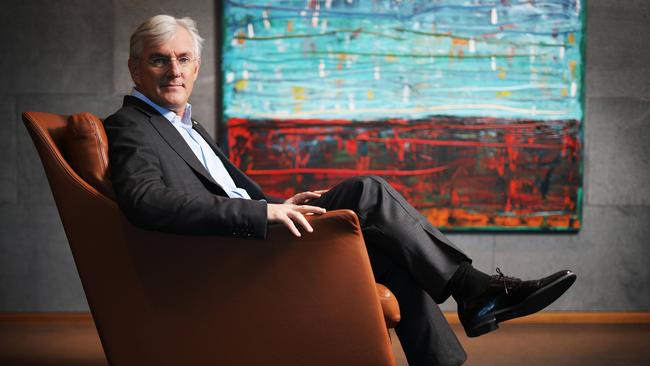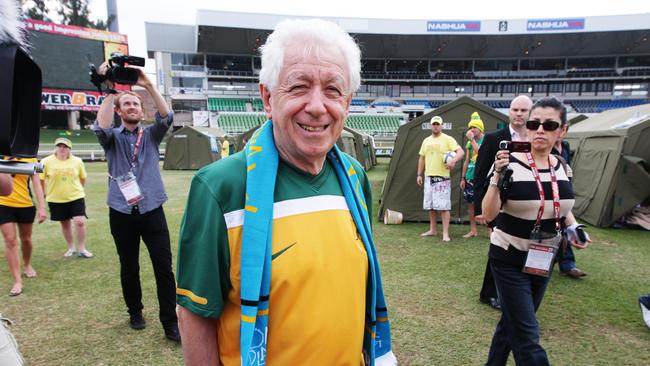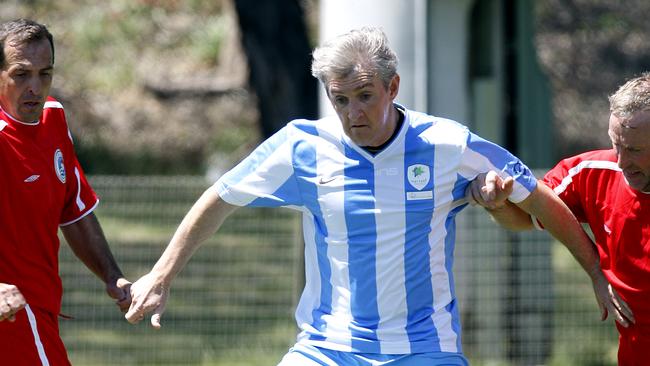Steven Lowy calls full time on football dynasty
Steven Lowy blames political infighting for his decision to end more than 50 years of his family’s involvement with soccer.

Steven Lowy will end more than 50 years of his family’s involvement with soccer, revealing he will end his tenure as chairman of Football Federation Australia.
Mr Lowy, who took over at the FFA from billionaire father and Westfield co-founder Frank Lowy in 2015, told The Australian yesterday he would not renominate for the position.
He blamed political infighting for his decision as the internecine war engulfing soccer rages on.
He and his board — comprising business names such as Pendal Group head of equities Crispin Murray and Caltex chief financial officer Simon Hepworth — have been at loggerheads with the wealthy owners of the 10 A-League clubs over who controls football’s purse strings and strategic direction.
Mooted corporate governance changes that would give the clubs more power would be “an unmitigated disaster for the game”, Mr Lowy said.
He said he would leave the role, given there was little prospect of a speedy resolution. “I’m doing this because of the politics in football,” he said.
“I’m taking myself out of the equation because for those that want a different outcome to the board and what the board believes in, I and my family are used as a distraction to the real issues.
“I want to remove from the debate once and for all any suggestion that the struggle to maintain an independent FFA board has anything to do with my personal interest or ambition.”

Mr Lowy will officially leave by the next FFA annual general meeting, to be held by the end of November, and denied he was standing in the way of reform.
He hit out at the mostly foreign club owners who, he claimed, would starve the grassroots of the sport of funds if mooted corporate governance changes were ratified within the next three months.
“We welcome foreign investment in our league. It is more than welcome; it is crucial. But when it comes to the whole of the game, it should not be controlled by foreign interests. That is what is at stake here.
“To those who are tired of the debate and wish for an outbreak of peace so that the game can get on with life, I say: be very careful what you wish for.”
Seven of the 10 clubs are at least partly owned by foreigners, including the Abu Dhabi and Chinese-controlled City Football Group that owns Melbourne City and English Premier League champions Manchester City.
The clubs have said they have more acumen to run the league, could negotiate better broadcast and sponsorship deals and leave running national teams and funding grassroots to the FFA.

Mr Lowy, now the chairman of listed tech firm OneMarket after the $33 billion takeover of Westfield by Unibail-Rodamco earlier this year, refused to rule out the prospect of a future return to the game should compromise be found. Such a move would mirror that of father Frank, who pulled his Sydney City out of the National Soccer League in 1987 when disillusioned with the political infighting that has plagued the sport for decades. “My dad was my age (55) when he walked away from football,” Mr Lowy said. “The parallel is that I’m choosing not to offer myself for re-election because of the politics of the game.”
The elder Lowy stayed out of soccer for 16 years before being enticed back by then prime minister John Howard in 2003 to run a sport that was financially on its knees. The NSL was disbanded and under the Lowy watch the A-League was established in 2005. The Socceroos have since qualified for four consecutive World Cups and the Matildas women’s team is one of the best in the world.
But having lost more than $300 million in 13 years, A-League club owners have been agitating for boardroom change and an independent league, in the belief it would unlock more revenue.
The increasingly bitter stoush that has pitted the Lowy-led FFA board against clubs, state federations and the players’ association has lasted for much of Mr Lowy’s tenure, resulting in a deadlock over the composition of the congress that elects the FFA board. The possibility of world governing body FIFA stepping in to sack the FFA board and install a “normalisation committee” to run the code has also been threatened.
A congress review working group was established to end the stalemate and recently made several recommendations including reshaping the congress from 10 members to 29 and calling for the A-League to become independent of FFA in time for the 2019-20 season. Mr Lowy and his board have opposed the voting structure that he believes would increase the power of the professional clubs, players and the clubs.
“The professional game plus two member federations can decide every future board composition of the FFA … The thrust is our opposition, and I’m speaking personally and on behalf of the FFA board, is that that compromises independence dramatically,” he said. “What’s more, they could also effectively control the development of a separated A-League, blurring the roles of members and directors.”
Mr Lowy said if such a scenario unfolded, soccer’s grassroots could be starved of funds that would instead be diverted to the clubs and players, who have long argued they deserve a greater share of broadcast and sponsorship income and higher wages.
“The key principle in this is we shouldn’t allow representation to be driven by money,” he said.
Mr Lowy conceded the infighting had “not helped” the popularity of the A-League, which suffered a slump in crowds and broadcast ratings last season.


